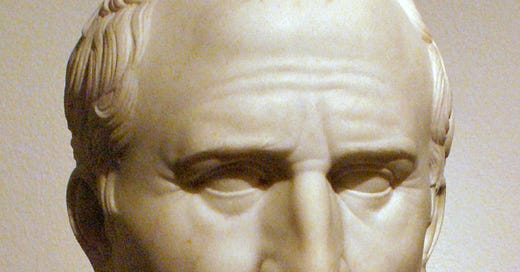Thessaloniki sits on the northwest coast of the Aegean, where the Greek shoreline curls around to the south as you travel away from Turkey. In antiquity it was part of Macedonia; Alexander the Great’s brother-in-law founded the city in 315 B.C. By the time Rome’s last great republican ended up there in 58 B.C., Macedonia was one of the prenatal empire’s four Greek provinces.
Cicero arrived in Thessalonica downcast and disheartened. He had fallen out of favor with the First Triumvirate, seeing in Julius Caesar and Pompey the Great a new breed of titans that would grind the ailing republic under their heels. Unable to see a place for himself in the world order projected by these lordly schemers, Cicero was chased out of Rome by the Triumvirate’s unofficial agent, Publius Clodius Pulcher.
Out in the reaches of Macedonia, Cicero found solace and favor with one of the province’s highest officials, Gnaeus Plancius. Plancius was Cicero’s lifeline in his time of sorrow, his friend and support as he nursed his disappointments and pined for home. So four years later, when they both were back in Rome, Cicero marshaled his formidable talents to defend Plancius against a charge of electoral bribery.
Anticipating that his detractors would accuse him of showing special favor to a benefactor, Cicero got out ahead of the charge: “do you think the judges will be less disposed to favor my cause because you accuse me of gratitude?” What follows (For Plancius 33.80) is among the most stirring defenses of gratitude on record. Here’s my own translation of the passage:
In truth, judges, though I aspire to be decorated with all the virtues, there is nothing I would rather seem to be, or be, than grateful. For this one virtue is not only the greatest but indeed the mother of all the rest. What is filial piety if not a grateful disposition toward one’s parents? What are good citizens, who is most deserving of his country’s favor in war and peace, if not he who remembers all the benefices of his fatherland? Who is pious in matters of religion, if not those who fulfill their obligation of gratitude toward the immortal gods with appropriate honors and due recognition? What enjoyment can we take from life if we’re deprived of friendship—and what friendship can there be between ungrateful men?
Among true friends, there are no debts. But the joy of thanksgiving is never greater than it is between those who don’t count costs. Cicero must have looked at his friend as he said those words, remembering his days in Thessalonica when he had nothing to offer Plancius in return for his kindness. He had something to offer now.
History is full of stirring coincidences, little grace notes that remind you the story has an author. Here is one of them: just about a hundred years after Cicero arrived there, the city of Thessalonica hosted another wanderer. On the second of his missionary journeys, Paul of Tarsus made his way out of the Levant, through Asia Minor, and into Greece by way of Macedonia. He founded Europe’s first Christian church in the city of Phillipi. And then he stopped in Thessalonica, where he left behind another small congregation.
Some years later—maybe in Corinth, maybe in Athens—Paul wrote what was probably the first ever epistle of the New Testament. The First Letter to the Thessalonians is 5 chapters long. It begins and ends with gratitude.
“We give thanks evermore to God for you,” wrote Paul to his fledgling converts, “making mention of you without ceasing in our prayers.” And then in closing, he told them to do the same: “rejoice evermore. Pray without ceasing. Give thanks in all things” (5:16-18). This man of sorrows, the last of the apostles, who would one day die at the hands of the state, gave thanks in all things.
In Greek the word “rejoice” is chairete. “Give thanks” is “eucharisteite.” Both are derived from the word charis: grace. Grace is an overflow, an abundance, piling good thing upon good thing. Tennyson’s Ulysses says that “life piled on life / Were all too little, and of one to me.” But Paul might have replied that even a little life, even a breath drawn, is abundance of grace.
The gratitude and the rejoicing flow from and into one another, the mother of all virtues giving birth to joy upon joy. From prison or from the Roman forum, from the city of gratitude to the wintry shores of Cape Cod where the Pilgrims landed, from even the troubled places of America right this minute: at all times, but today especially, I say to you, rejoice evermore. Pray without ceasing. Give thanks in all things.
Happy Thanksgiving,
Spencer
Listen to the latest from Young Heretics:





Spencer, every time I think reading one of your columns will have nothing to interest me, I am pleasantly surprised. This is another interesting and enlightening essay. Only you could tie ancient Rome, St. Paul and the first Thanksgiving together so seamlessly.